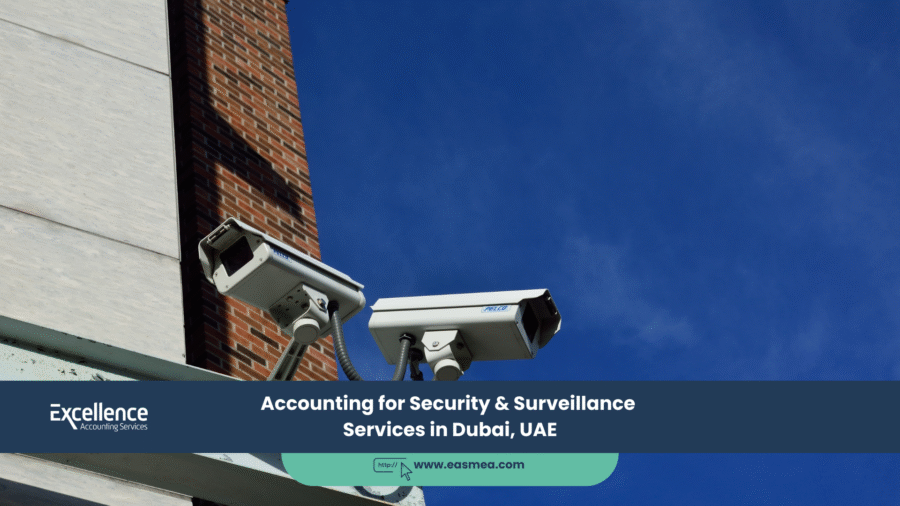Accounting for Security & Surveillance Services in Dubai, UAE
In a global hub like Dubai, the security services industry is the bedrock of safety and confidence for businesses and residents alike. This sector is a complex fusion of labor-intensive manpower services and cutting-edge technology solutions. From deploying guards at a construction site to monitoring a city-wide network of CCTV cameras from a high-tech control room, the financial operations are uniquely challenging.
- Accounting for Security & Surveillance Services in Dubai, UAE
- The Financial Command Center of a Security Business
- Core Accounting Principles for Security Services
- Navigating UAE Tax and Regulatory Compliance
- What Excellence Accounting Services (EAS) Can Offer
- Frequently Asked Questions (FAQs)
- Secure Your Bottom Line.
Profitability in security services is not just about winning contracts; it’s about managing your largest cost—payroll—with absolute precision, accounting correctly for long-term service contracts, and making strategic capital expenditure decisions. How do you accurately cost a contract when guard schedules and overtime are variable? How do you book revenue for a three-year alarm monitoring contract paid upfront? Is a new server for your control room an expense or an asset? Errors in these areas can compromise cash flow, distort profitability, and lead to non-compliance with entities like Dubai’s Security Industry Regulatory Agency (SIRA).
This guide provides a security blueprint for Accounting for Security & Surveillance Services in Dubai. We will patrol the critical financial zones of your business, from guard payroll and scheduling to AMC revenue and capital expenditure, ensuring your financial foundations are as secure as the clients you protect.
Key Takeaways
- Payroll is the Primary Cost Driver: Accurate tracking of guard hours, overtime, and shift differentials is paramount. Payroll costs must be allocated to specific contracts to determine job profitability.
- AMC Revenue Must Be Deferred: Upfront payments for Annual Maintenance Contracts (AMCs) for alarm systems are a liability. Revenue must be recognized on a straight-line basis over the contract term.
- Control Room Tech is a Capital Expenditure: High-value technology like servers, video walls, and software licenses are fixed assets that must be capitalized and depreciated over their useful life.
- Contract Costing is Essential: You must calculate the total cost of each contract, including guard salaries, supervision, equipment depreciation, and other overheads, to ensure it is profitable.
- Compliance is Key: Adherence to UAE labor laws (WPS), SIRA regulations, VAT, and Corporate Tax is non-negotiable and requires meticulous record-keeping.
The Financial Command Center of a Security Business
A security firm’s financial success depends on balancing its two core components: manpower and technology. The cost of labor is immediate and recurring, while technology involves large, long-term investments. An effective accounting system acts as your financial command center, providing the intelligence needed to manage both efficiently. Strategic financial oversight, often provided through CFO services, is critical for aligning these components for growth.
Core Accounting Principles for Security Services
Securing your profits means locking down three key areas: payroll, contract revenue, and capital assets.
1. Guard Payroll and Scheduling
For most security companies, payroll is the single largest expense and the most complex to manage.
- Accurate Time Tracking: You must have a reliable system for tracking regular hours, overtime, holiday pay, and any shift differentials for every guard. This data is the foundation of your payroll.
- Job Cost Allocation: The total cost of a guard (salary, visa costs, accommodation allowance) must be allocated to the specific client sites they work on. This is the only way to accurately calculate the profitability of each contract.
- WPS Compliance: All payroll must comply with the UAE’s Wages Protection System (WPS). A professional payroll service is essential to ensure accuracy, timeliness, and full compliance.
In the security business, your timesheets are as important as your contracts. Every hour must be tracked, allocated, and billed correctly to protect your margins.
2. AMC Revenue for Alarm Systems
Annual Maintenance and Monitoring Contracts (AMCs) provide stable, recurring revenue but have specific accounting rules.
- Deferred Revenue Principle: When a client pays AED 1,200 for a one-year alarm monitoring contract, this is not immediate revenue. It is a liability on your balance sheet called “Deferred Revenue.”
- Straight-Line Recognition: You earn this revenue over the life of the contract. Each month, you would move AED 100 from the Deferred Revenue liability to “Service Revenue” on your income statement. This correctly matches the revenue to the service period.
- Billing and Collections: For clients on monthly or quarterly billing, a disciplined accounts receivable process is vital to prevent cash flow gaps.
3. Capital Expenditure on Control Room Technology
Your control room is your technological heart, and it requires significant investment.
- Capitalizing vs. Expensing: The purchase of durable, high-value items like servers, video walls, specialized software licenses, and monitoring stations is a Capital Expenditure (CapEx). These are not expensed immediately.
- Depreciation: These assets are recorded on the balance sheet and depreciated over their useful life (e.g., 3-7 years for tech). Depreciation is a non-cash expense that reflects the asset’s use over time.
- Asset Management: Maintaining a detailed fixed asset register is crucial for tracking the value of your technology and for tax purposes.
| Financial Item | Description | Accounting Treatment |
|---|---|---|
| Monthly Guard Salaries | Total payroll for all security personnel. | Record as “Salaries Expense.” Must be allocated to specific contracts for job costing. |
| Upfront AMC Payment | A client pays AED 24,000 for a 2-year monitoring contract. | Record as Cash and a liability (Deferred Revenue). Recognize AED 1,000 as revenue each month for 24 months. |
| New Control Room Server | A server purchased for AED 50,000 with an expected 5-year life. | Capitalize as a Fixed Asset. Record AED 10,000 in depreciation expense annually (straight-line). |
| Patrol Vehicle Maintenance | Routine oil change and tire rotation for a patrol car. | Record as “Repair & Maintenance Expense” in the period it occurs. |
Navigating UAE Tax and Regulatory Compliance
The security industry is heavily regulated and has clear tax obligations. Always consult official sources like the SIRA website for industry rules and the Federal Tax Authority (FTA) for tax laws.
VAT on Security Services
The provision of security guarding, alarm monitoring, and related services is subject to the standard 5% VAT rate. You must issue compliant tax invoices and ensure your VAT implementation and filing processes are robust.
UAE Corporate Tax
Your security firm is subject to the 9% UAE Corporate Tax on taxable income over AED 375,000. Your taxable profit is heavily influenced by the accuracy of your payroll allocation, depreciation schedules, and revenue recognition methods. Meticulous record-keeping is not just good practice; it’s a legal necessity. Engaging with corporate tax professionals is vital for compliance.
What Excellence Accounting Services (EAS) Can Offer
Managing the unique financial demands of a security services company requires specialized expertise. At Excellence Accounting Services, we provide solutions to secure your financial future.
- Payroll & WPS Management: Our expert payroll services ensure your guards are paid accurately, on time, and in full compliance with UAE labor laws.
- Contract & Revenue Management: We establish proper accounting for AMCs and other contracts to ensure accurate financial reporting and cash flow management.
- Financial Control & Audit: Our internal audit services can review your billing and payroll controls to prevent revenue leakage and overspending.
- Strategic Financial Planning: From business valuation to advising on major capital expenditures, we provide the high-level financial guidance you need to grow.
- Comprehensive Accounting: We can manage everything from your accounts payable to your final financial statements, giving you a clear view of your business health.
Frequently Asked Questions (FAQs)
These are part of the total employment cost. Like salaries, these costs should be allocated to the contracts or sites where the guards work. This gives you a “fully-loaded” cost per guard, which is essential for accurate job costing and pricing.
For a one-off event (e.g., a concert), you recognize all revenue and direct costs in the period the event occurs. For a long-term contract, revenue is recognized monthly, and costs are allocated monthly, providing a smoother, more accurate picture of ongoing profitability.
If the uniforms and equipment have a useful life of less than a year, they are typically expensed as “Supplies” or “Uniform Expense” when purchased. If you invest in more durable, high-cost equipment (like specialized vests), it could be capitalized and depreciated over a short period.
The disputed amount remains in Accounts Receivable until resolved. If you agree to a credit, you issue a credit note, which reduces your revenue and the receivable balance. If the client refuses to pay and the amount becomes uncollectible, it must be written off as a “Bad Debt Expense.”
The installation is a separate service from the ongoing monitoring. You should recognize the revenue from the installation once it is complete. The cost of the hardware installed (panels, sensors) and the technician’s labor are the Cost of Goods Sold for that installation.
Yes. They have different useful lives. A vehicle might be depreciated over 5 years, while computer equipment might be depreciated over 3 years. Using different, appropriate depreciation schedules for different asset classes is a standard and correct accounting practice.
Fines and penalties are not a normal operating expense. They should be recorded in a separate expense account like “Fines and Penalties.” Importantly, such fines are typically not deductible for Corporate Tax purposes.
This is a major industry challenge. Solutions include: negotiating for upfront mobilization fees on new contracts, offering small discounts for early payment of AMCs, and implementing a very strict collections process. A detailed cash flow forecast is your most important management tool.
No. A recurring monthly Software-as-a-Service (SaaS) fee is an operating expense, typically recorded as “Software Subscriptions” or “IT Expenses.” It is not capitalized because you do not own the software.
Accurate accounting data is the foundation of quoting. By knowing the fully-loaded cost of a guard per hour (salary + visa + accommodation + uniform + overhead allocation), the running cost of a patrol vehicle, and your desired profit margin, you can build a quote from the ground up that ensures profitability.
Conclusion: Your Financial Shield
In the security and surveillance industry, your reputation is built on reliability and trust. Your financial stability should be no different. A robust accounting framework that provides tight control over payroll, clear visibility into contract profitability, and strategic management of capital assets acts as your financial shield, protecting your business from internal risks and positioning it for secure, long-term growth.
Secure Your Bottom Line.
Let Excellence Accounting Services implement the specialized accounting systems your security firm needs to manage costs, maximize profits, and operate with confidence.




